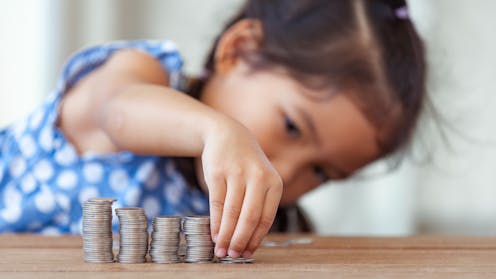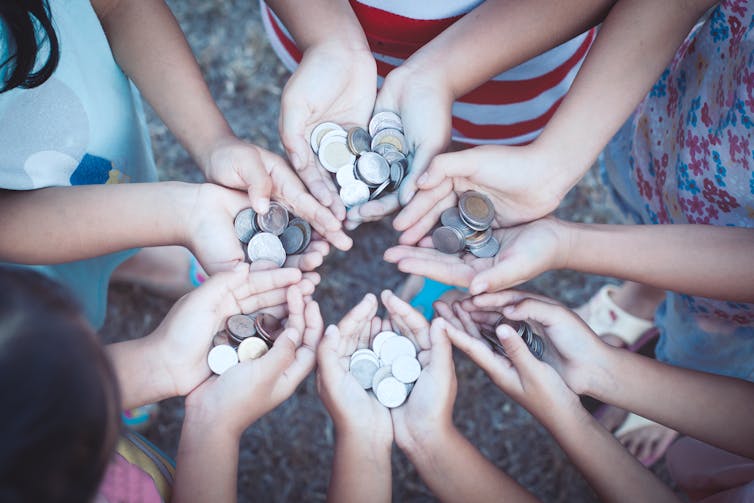
If you’re a parent, the summer holidays and approaching new school year might have you questioning your children’s access to pocket money – how much they get, how much they’re spending and what they’re spending money on.
How pocket money is provided varies. So be reassured there is no right, wrong or normal way to give your kids money. For some households, it will be weekly small amounts simply for kids to use at their leisure. For others, it will include forms of payment for work done around the house.
According to recent data from NatWest, children get an average of £3.85 a week, and £9.13 if you factor in income for chores.
While around one in three households give regular allowances, many households give pocket money flexibly. Much of this flexibility depends on how much children contribute to the household.
The language used in recent years in reports from banks such as NatWest and GoHenry on pocket money describe “entrepreneurial”, “determined” and “industrious” children who are earning more and spending responsibly. NatWest claims children are learning “great money management” and “positive behaviours”.
This positions pocket money as more than just disposable income – as a learning opportunity. But it’s worth looking closely at what money teaches children, and what it is we want them to learn.
On the face of it, teaching children to be hardworking, and rewarding that hard work, sounds alright. But we need to consider this carefully in a time of work precarity, debt and declining welfare.
This kind of financial literacy encourages an individualised idea of what money is and how it is valued. The consequence of this is that inequalities in income and finances become linked with personal failures of “not working hard enough”, rather than systemic problems.
In reality, a lack of access to money is not often a reflection of how hard someone works, but based on background, race, gender or disability.
Banks’ advice for parents also suggest that pocket money can be used to reward good behaviour. But what good behaviour means is up for debate. For one thing, it likely varies between parents and children, so becomes a tool for what parents think good behaviour is.
Money has a social power that children understand. My research demonstrates how they can use this to negotiate with each other, interpret parent rules and most importantly rework for their own purposes. I document the example of the teenage girl who knew her parents would give her more money if she went out with people they approved of. While the girl saw this as something she could negotiate for her own benefit, we must also ask what this teaches kids about coercion and control.
The risk is that parents will inadvertently encourage their children to associate money with control and a need to conform to access money. The effect of this can be far reaching.
Forthcoming research by my colleague at the London School of Economics, Liz Mann, explores how witnessing controlling behaviour over money in childhood may increase women’s desires for independence in adulthood, even if this leaves them economically disadvantaged in their relationships.
Building a better future
If we are going to make connections between money and behaviour, it would be far better to think about traits such as kindness, generosity, inclusivity. The evidence is there to suggest this is much more in line with how children think about and use money.

Children are very aware of their families’ financial situations and often adjust their spending around this. They are also savvy and communal with how they think about money. They create their own little economies based on sharing, borrowing and bartering with each other. These are much better skills of responsibility centred around sharing and caring.
NatWest’s recent report also suggests that, while kids might be feeling the cost-of-living squeeze every bit as much as adults, they remain steadfast in their generosity. They donate to causes important to them, including social, medical and environmental issues. Given the inclination for donations, there is scope to encourage a new generation of socially minded spenders.
This can include conversations with children on where their money comes from and where goes when they spend it. Think about how their money can support local, small businesses which sustain and develop local communities, rather than big business. Think too, about their awareness of differences in household income, and use this as a tool to discuss inequality in income and wealth and the benefits of redistribution.
Rather than focusing on ideas of “good” behaviour, or that their own industriousness is all they need to sustain them, we should be taking the lead from kids and encouraging discussions of money in ways which can include topics of fairness, redistribution and ethical spending. That is the kind of social power pocket money should encourage.
Gaby Harris has received funding from the Economic and Social Research Council.
This article was originally published on The Conversation. Read the original article.







